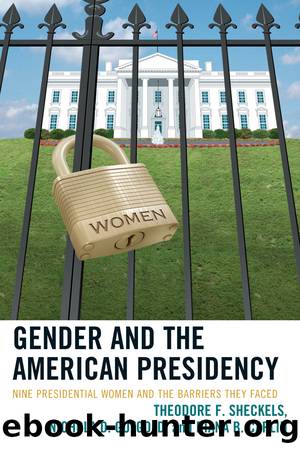Gender and the American Presidency by unknow

Author:unknow
Language: eng
Format: epub
Publisher: Lexington Books
Published: 2012-01-15T00:00:00+00:00
7
Olympia Snowe: Seeking a Sensible Center
âEssential to the success and stability of any government is the equal voice and participation of women.â
âOlympia J. Snowe1
During the early months of Wisconsin Republican Senator Joseph McCarthyâs campaign to expose Communists and Soviet spies who were allegedly infiltrating the U.S. government, neither Democrats nor Republicans challenged their colleagueâs claims in a floor speech. On June 1, 1950, that changed when Maineâs Republican Senator Margaret Chase Smith rose to speak on the Senate floor and delivered her Declaration of Conscience. Without ever naming McCarthy, she spoke of âa serious national condition that could result in national suicide and the end of everything that we Americans hold dear.â She decried the lack of leadership that was turning the Senate into âa forum of hate and character assassination.â She described the perspective from which she spoke: âI speak as a Republican. I speak as a woman. I speak as a United States Senator. I speak as an American.â2
Those same words easily describe the approach Maineâs second woman senator, Olympia J. Bouchles Snowe, has taken since her election to the U.S. House of Representatives in 1978. Snowe may disagree with her partyâs president or leadership, but she is philosophically comfortable as a Republican, just as Nancy Kassebaum was although she also frequently disagreed with leadership. Snowe does not call attention to herself as a woman candidate, but she has dedicated her career to improving womenâs lives. Many elements of her style fit a more feminine approach to governing. She is one of the most highly respected members of the Senate, and she puts the countryâs needs above party and political gamesmanship. Thus, Snowe, like Smith, is known for her independence, her intelligence, and her integrity. Those qualities have brought her praise for her bipartisan approach, but they have also brought criticism from members of her own party. In many respects, her moderate positions have made it impossible for her to rise to a position on a national ticket.
A Life of Tragedy and Triumph
Olympia Bouchles was born February 21, 1947, in Maineâs capital of Augusta to a Greek immigrant father and a first-generation mother with roots in Sparta.3 By the time she was ten she had lost both parentsâher mother to breast cancer and her father from a heart attack. She was sent to live with an aunt and uncle and their five children in Auburn, Maine, and her brother was sent to live with other relatives. A year later her uncle also died. After her motherâs death, her father had sent her to a Greek Orthodox girlsâ boarding school in Garrison, New York, which she continued to attend for five years after her relativesâ guardianship commenced. She traveled by train to visit her family, first her father and brother and then her aunt and cousins, often having to change trains at Grand Central station where she once had to spend the night sleeping on a bench. She considered her early life experiences to be instrumental in creating her independent spirit as much as being from independent spirited Maine.
Download
This site does not store any files on its server. We only index and link to content provided by other sites. Please contact the content providers to delete copyright contents if any and email us, we'll remove relevant links or contents immediately.
| Africa | Asia |
| Canadian | Europe |
| Holocaust | Latin America |
| Middle East | United States |
Fanny Burney by Claire Harman(25792)
Empire of the Sikhs by Patwant Singh(22185)
Out of India by Michael Foss(16315)
Leonardo da Vinci by Walter Isaacson(11918)
Small Great Things by Jodi Picoult(6108)
The Six Wives Of Henry VIII (WOMEN IN HISTORY) by Fraser Antonia(4799)
The Wind in My Hair by Masih Alinejad(4427)
The Lonely City by Olivia Laing(4126)
The Crown by Robert Lacey(4114)
A Higher Loyalty: Truth, Lies, and Leadership by James Comey(4039)
The Iron Duke by The Iron Duke(3650)
Millionaire: The Philanderer, Gambler, and Duelist Who Invented Modern Finance by Janet Gleeson(3576)
Sticky Fingers by Joe Hagan(3456)
Alive: The Story of the Andes Survivors by Piers Paul Read(3320)
Papillon (English) by Henri Charrière(3279)
Joan of Arc by Mary Gordon(3270)
Stalin by Stephen Kotkin(3091)
Aleister Crowley: The Biography by Tobias Churton(3026)
Ants Among Elephants by Sujatha Gidla(2928)
